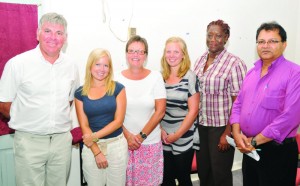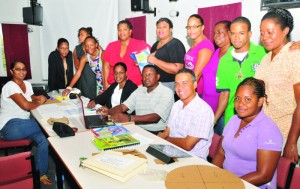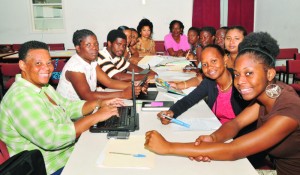
Primary School teachers in Anguilla have just emerged f0rom a week-long intensive, yet simplified, workshop on the teaching of mathematics aimed at achieving better results in the island’s classrooms.
The facilitators were a team of teachers from the Isle of Wight with which Anguilla’s Education Department has established a close working relationship. They included Gary Booth, an Education Officer; his wife, Jane Booth, a G1 teacher; Lucy Lycett, also a G1 teacher; and Jenny Lycett, G2 teacher and Numeracy Coordinator.

“Anguilla’s results in mathematics have been low as everyone,” local Curriculum Officer, Mathematics, Vijay K. Sharma, explained. “We have therefore embarked on the ‘Project 4 Success’ (PM4S) in which our efforts will combine the primary schools as well as the secondary school. The workshop is basically to provide an extra input to transfer the knowledge of mathematics to improve the performance in the primary schools.”

Mr. Sharma went on: “Right now we are concentrating on basic maths. It means that if the foundation is weak, regardless what kind of maths you want to do – whether pure or applied – you won’t be successful. Education is not something like a cake-shop where, at the end of the day, you know what profit or loss you have made. It is going to take time and, for that reason, it has to start at the lower level so that the foundation is strong and the development will be positive. Maths per se is not hard. It is how we teach the subject to those who have no idea about it…If the teacher fails to put the maths in perspective to a child, or even an adult, it becomes difficult.”
Gary Booth, the visiting lead facilitator, said: “The first thing I would say is that what Anguilla is facing in its development work with mathematics is international. This is not just a problem that Anguilla faces. We come from the Isle of Wight where a lot of money is put into developing mathematics education; and we are just here to share some of the work that has been done in the UK with our Anguillian colleagues.
“Around the world, literacy has been the focus of many education systems and no one will argue about the importance of literacy. However, we also have to ensure that our children are numerate as well as literate. The focus that we brought to the workshop, in part, is that you have to look at the individual needs of children. Until you drill down into the needs of the individual, it is very difficult…The workshop has been for teachers from grade three to grade six. This is the start, and what I am pleased about is that Anguilla has grasped the nettle of saying ‘we continue to work on literacy but now the drive is to improve numeracy and mathematics.”’
Ms Jenny Lycett, who has responsibility for raising the level of the maths of the children in the Isle of Wight, was pleased to be of assistance to Anguilla. “The idea of coming here was partly to be able to share with them some practical ways of delivering maths; and ways of teaching mental maths and problem-solving that may be different from what they are using at present. I hope they will now apply these practices in their own classrooms.”
Mr. Sharma said the ball was now in the court of the teachers who were equipped with almost every method of teaching maths. “We have provided them with the documents and the practical experience, within the workshop, about how to plan etc. They now have to go back in the classroom and execute those plans we discussed,” he stated. “This is the first phase of the ‘Project Maths 4 Success’. The next one will be for kindergarten and grades one and two – may be next summer.
“Continuing alongside is our secondary school programme for which we have already developed the objectives with respect to forms one to three. This will help to monitor the growth of the children and how much they have acquired. Right now, there are a large number of children in the secondary school who do not grasp the subject, or fall through the systems somehow, thus not achieving the standard that we would like them to have. That is the third stage in which they will be brought on board.”
Sandra Fahie, Education Officer, Curriculum, joined in saying that the low performance of the students in maths was a concern for the Education Department over the years. “When we look at the secondary level, we are aware that CXC has concerns about the overall performance of our students in mathematics this year despite those who excelled. So we are on board with the region in terms of improving the work of our students. We are starting this project now so that in the next five years, when our students reach the CXC level to do maths, we expect to see their performance improved.”







